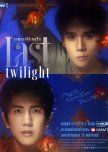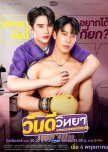
This review may contain spoilers
I'm saddened that Day's words in the last episode were completely misinterpreted
What Day is referring to is his life at the beginning, when he discovered that he would go blind and that his injury could be treated with a transplant. At that moment, Day felt like his life was over, so he locked himself in his room, frustrated and depressed, waiting for surgery. He forgot to live for that entire year, he became a statue like Mee, and he was willing to fade away and to make himself invisible to the eyes of the world until his current situation could change at some point. It was one of the hardest and loneliest moments of his life. Until Mhok arrived and showed him that life went on and that there were many things he could do. Day went out into the world again, interacted with his friends again, began to make plans, participated in activities, traveled, danced, had fun, fell in love, made love for the first time... He realized then that he could live his life in the same way as others. As he accepted his new reality, Day regained his will to live and enjoyed himself again. He fought for his independence, finished his degree, opened his own bookstore, gave talks at the association, wrote a book... Day had a full and happy life, one in which he developed professionally, one in which he felt fulfilled, one in which he proved to the world and to himself that he could handle himself. If you look at the scenes of Day when he regained his sight, you can see him doing what he had already done when he was blind: he participated in a marathon again, he hung out with his friends, he went on dates with Mhok... his life was still the same, because his life was already normal before he regained his sight.Therefore, Day talks about the difficulties and painful moments he faced throughout the process, but in the end, when he managed to accept his reality and adapted to it, he began to see the light and he started living his life. He no longer wanted to be locked in his little corner, he wanted to be part of the world.
It surprises me that people say that Day's words imply that to be normal is to be able to see... Hasn't Day repeated ad nauseam that he didn't want anyone to pity him? Hasn't he said time and time again that he doesn't want to be treated or seen differently simply because he can't see? Hasn't Day shown his displeasure with the fact that others might think he can't take care of himself? Because he is a normal person and wants to be treated as such. Have you forgotten all this?
How can you say that this series is ableist when it shows the opposite? They have strived to teach us during 12 episodes that people with disabilities can have autonomous, full and happy lives. We see it through Aon and we see it through Day. Let's not forget that everything Day achieved, he achieved while he was blind. Day was already happy before he regained his sight, so his current happiness does not depend solely on being able to see.
The series is not telling us at any point that disability must be cured to be happy. Day has an injury for which there is treatment. They tell us from minute one, and from minute one, he is on the waiting list. Day was not born blind nor does he have a permanent disability. My question is: would you say to those people who have the same injury as Day and who have also decided to have surgery that both their choice and their own experience are not valid? Would you tell them that everything they have experienced and learned as blind people does not count for anything because in the end they have recovered their vision? Is there only one valid experience in the world? Is there only one reality and only one representation? Isn't that a bit discriminatory? Would you say to those people: don't have surgery, it is better that you remain blind, so everything you have previously experienced will not have been in vain? Would you tell them: yes, I prefer that you not regain your sight, so you will be a more inspiring person to me? Would you make all these people feel bad because they have a treatment option while many other people in the world don't?
Because then, if you are not able to empathize with a fictional character, you will not be able to empathize with a real person either. Everyone has the right to decide about their own life and their own body. Everyone has the right to choose what makes them happiest. Day should not be judged for wanting to regain his sight. Day shouldn't be judged for feeling like it adds a little more happiness to the happy life he already had when he couldn't see. Day was happy when he couldn't see and Day is still happy now that he can see, that hasn't changed. Because his happiness is mainly due to everything he has managed to do for himself, everything he has achieved in life, everything he has learned and all the people around him. Because what is essential, what is important, is invisible to the eyes.
Day's blindness not only changed his life, it also changed the lives of Mhok, Night and Porjai. They would not be where they are now nor would they be the same people they are today, if it were not for this entire process. Day regaining his sight doesn't change any of this. The result is the same. For that same reason, the series does not develop Day's life much further after regaining his sight, because it is not going to change anything that they have already shown previously.
This series shows us different realities and different possibilities, and teaches us that they are all equally valid. Last Twilight is a song to resilience, to the ability to adapt to new circumstances and situations. It teaches us that, although we cannot always change our reality, we can change the way we face it. Day is an inspiring character, a clear example of struggle and improvement and that does not change, regardless of the ending. So I encourage you to watch the series again from the beginning and, this time, reflect on what they are showing you. It is very unfair that a series is brought down simply because people have not understood the message.
Was this review helpful to you?

Every day can be a good day
We can find happiness in the little things. That's what Wandee Goodday shows us. This series is very intimate, it has a very simple but at the same time deep plot. This story is not only reduced to a romance, but shows all the other aspects of any person's life: family relationships, professional life, internal conflicts and personal growth. It tells us about how its characters feel, their fears and insecurities, their traumas, their dreams and goals, their relationship with themselves and with others.Not everyone may connect with this story, but I also think it can be a safe, comforting, and encouraging place for many other people. It is not a perfect series but overall it is very satisfying. In fact, for me, the original novel this series is based on pales greatly in comparison. The novel is very superficial but the series has been able to give depth to the plot and its characters and has dealt with many important topics. I really liked that they talked about sexual health and sexual games, asexuality, equal marriage and mental health.
Yak's trauma has been given the importance it deserves. And the representation they have made of that trauma has seemed very symbolic to me: we are our own shadow and our worst enemy. All the guilt and regrets, the demands, the things we don't like about ourselves or that embarrass us, take up more space the more we reject them and the more we want to hide them. The moment we accept it and face it, all of it stops having so much power and influence over us. What happens in the ring during the last fight has been emotional and liberating, as it shows us that, although this process is hard and difficult, in the end we come out stronger. And having an environment that supports you during this long process is key, as it gives you the strength you need.
Dee and Yak have been two great characters. Both are Green Flag.
Dee is sensitive, mature and empathetic. He has a big heart, greatly values the people around him and always takes other people's feelings into consideration. The fact is that Dee has little confidence in himself, he's afraid of being abandoned and he's afraid of not being valid enough to be loved. This makes it difficult for Dee to formalize his relationship with Yak. Meeting Yak really helped Dee value himself, feel loved and respected, and feel more confident. And this process has taken time, just as Yak's own process has taken time, because fears and emotional wounds do not disappear or heal overnight.
On the other hand, Yak is sensitive, respectful and affectionate. He's like a golden retriever. Meeting Dee helped Yak forgive and love himself, grow and dare to do new things.
They both support and motivate each other, care, respect and value each other. They treat each other with great softness, sweetness and tenderness. And between them there is communication, consent and mutual understanding. They have one of the healthiest relationships I've ever seen. Every gesture, every word, every look, every moment between them melts my heart. And I love the flirtation between the two, that game of tug of war.
Great and Inn have managed to convey many emotions to me and with their interpretations I have been able to feel all the love and desire that exists between Yak and Dee.
I also liked the secondary couple. Oyei had to fight a lot and sacrifice to move the family business forward and to help his little brother fulfill his dreams. He had to assume a role that did not correspond to him and was subjected to many pressures and many burdens. I'm glad he has someone like Cher by his side, someone strong to help him carry the load, support him and understand him.
The only aspect that has not completely convinced me has to do with Dr. Ter and the ending they gave him. Otherwise, I loved this series and, in the end, it has become one of my comfort series. It has given me a lot of happiness every week. I'm going to miss this series and its characters a lot.
Was this review helpful to you?






